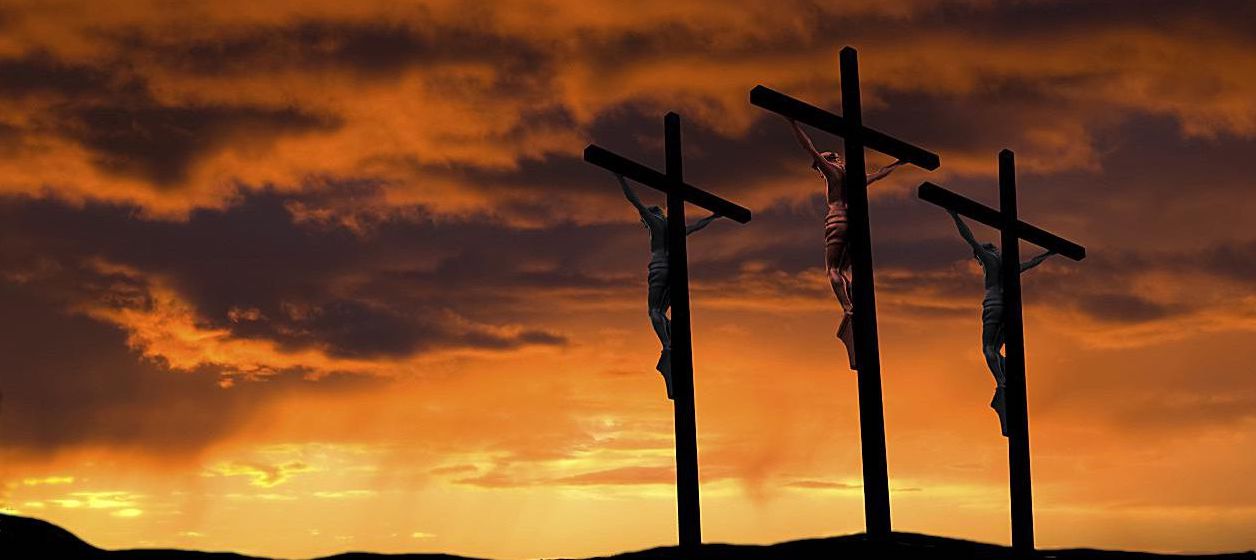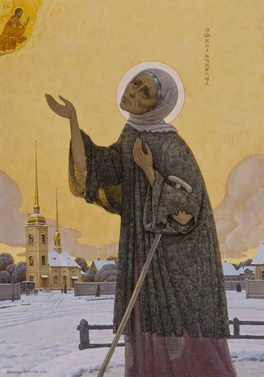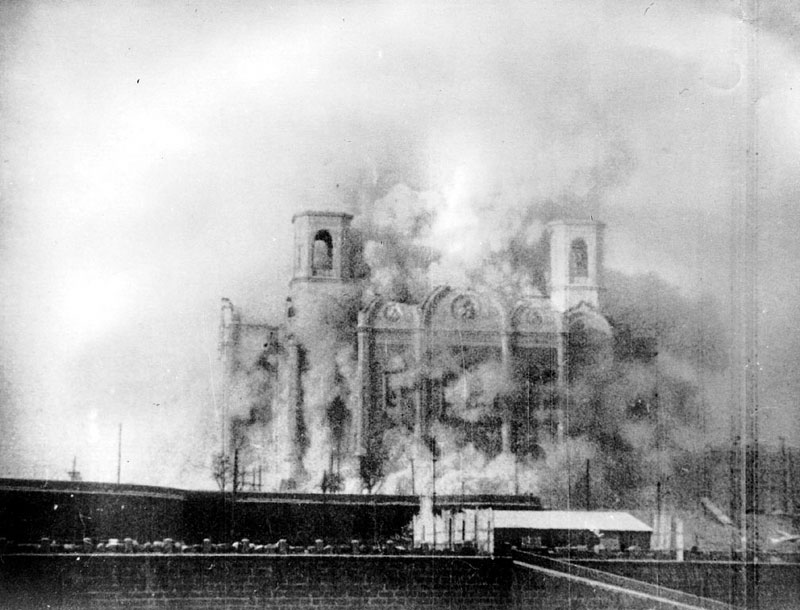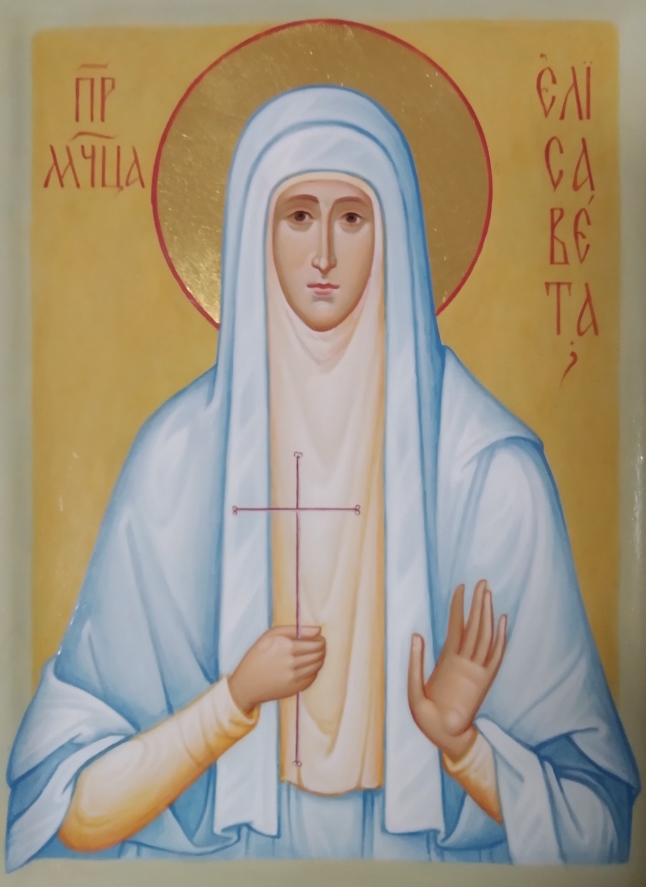
John 21:15-25 (Matins)
Romans 8:28-39
Luke 21:8-19
The Fool on the Hill
"I will give you a mouth and wisdom"
(Lu 21:15)
The Church calendar today invites us to reflect on two different orderings of the world.
When Jesus says that He will give us a mouth and wisdom,
he implies an alternative that is not spoken,
which is unwisdom in God's eyes.
So let us look out on the world bearing in mind these two:
the wisdom of men
and
the wisdom of God.
A planet perfect in harmony, health, and beauty, self-regulating vs. A dying world squeezed dry by rapacious greed, no longer able to regulate itself
Living in harmony with God through moral life, which we call God's way vs. A society sickened by pornography and drugs, making it own rules
Worshiping God in the beauty of holiness vs. Neglecting God and outlawing godly life
We can understand
why young people should doubt that such a world of beauty and peace ever existed.
Such a world seems impossible from the perspective of now:
with its emphasis on moral life,
its pervasive worship of God,
and
our beautiful planet with its clean, healing oceans,
its limpid rivers and streams,
it clear, pure air,
its abundance of pristine water,
and
its
unspoiled open spaces.
We ran free through these fields and spaces.
But
it is hard to imagine for people recently born into it.
Yes, we remember this world.
We saw it.
We gloried in it all day on Saturdays.
And
we cherished it.
We prayed in our schools during the week.
We walked on
quiet streets on the Lord's Day
(for everything was closed).
Families gathered.
And our entire society honored the day of rest.
What happened to this vanished world?
The answer is simple:
we decided to go our own way.
What is more,
we decided that God's way was "foolishness."
"Why should I close my liquor store on Sunday?!
That's 20% of all my profits .... since people are not at work!"
Isn't this what St. Paul foresaw?
For since, in the wisdom of God, the world through wisdom did not know God,
it pleased God through the foolishness of the message preached to save those
who believe.
|
We Christians have foolishness, St. Paul writes:
Christ Jesus, and Him crucified.
This subject is always a temptation for me to go on a long detour.
for we live in an era when people actually believe that science has replaced religion.
But without getting into
the limits of science,
let us say briefly:
technology and science will not save us.
Far from it!
Their powers have led us down a path of universal destruction.
As our parents' generation had rightly feared with the development of the A-bomb,
(whose effects, by the way, have irreparably injured our planet),
we have loosed countless other, evil genies with our so-called advancements,
which have destroyed our only world.
Not the least today,
is a weaponized virus
leaked from a gain-of-function, genetic-engineering lab
shocking the world with its first pandemic,
affecting the whole globe, not simply countries or continents.
Was the world made of wood and steel, cotton and wool, glass and earthenware
so hard to bear?
Would we really have chosen to exchange somewhat longer lifespans
instead of bequeathing a world
of beauty and goodness to our children and grandchildren?
Would we have made that choice?
The point here is a most simple one:
the works of man,
the mind of man is lethal.
As a thought experiment,
let us consider a human species
that did nothing more than work farms and hunt for game
in a life regulated by God's book of life.
(You remember that Eden's fundamental sin was to demand more than everything, which was Eden.)
This simple "nothing more"
would have "solved" a most urgent problem which no one now can solve:
which is the loss of our planet home
and
the end of decency.
Hasn't this been the master question now for decades and centuries:
shall we bow before God,
or
shall we bow before the gods of human intellect, technology, and science?
We have chosen materialism,
which is the belief system declaring matter
(sub-atomic particles, atoms, molecules, and cells)
to be the only thing that exists.
Notice the differences between spiritual and materialist sensibilities.
Spiritual people seek reconciliation with those who hate them.
They seek lowliness and humility and self-sacrifice.
The materialist mind, on the other hand, tends to be
proud,
competitive,
even warlike.
It is not enough to ignore harmless religionists,
whom they deem fools.
They must be marginalized,
destroyed,
and
their whole lifeworld annihilated.
Eighteenth-century Russia in a few decades repeated the materialist path
which the West had followed for centuries,
which is the mania known as
empiricism.
When Peter I ascended the throne,
Holy Rus' had reached a zenith of spiritual life
—
a lifeworld of devout Christians
from boyars down to every peasant's son and daughter:
spread out over ten time zones,
filled to overflowing with icons
in the beautiful and humble
worship of God.
By the end of Tsar Peter's half-century reign,
the office of Patriarch of the Russian Orthodox Church had been abolished.
Men were forbidden to enter monasteries, except at the end of their lives.
And the Church would be governed by the State.
Materialism had seized the upper hand in the space of one Tsar's reign.
And Russia's new gods would be scientific ones.
This was a heady period for the empiricist party
as rationalist ideals of the Western "Enlightenment"
became the new heart transplanted into the Russian land.
At the Hermitage,
we see the so-called Enlightenment
as the Darkening,
when human intellect sought to supplant the Divine,
whose aim
was to root out spiritual beliefs and exposed them as a sham.

It was into this new world that
Xenia Grigoryevna Petrova
was born (c. 1719).
Called a "Fool for Christ,"
she appeared among in the heart of Russia's empiricist movement,
St. Petersburg,
called "the Window to the West,"
a city founded and developed by
Peter I.
Xenia reminds Catholic Christians in the West
of a girl
who yearned for traditional religious life,
Margaret Mary Alacoque (d. 1690).
Margaret Mary
was placed by her family into a new kind of
religious order, the Ursulines,
who
forbade traditional devout life,
embracing
the new "Enlightenment" philosophy,
which
had become fashionable in salons of Paris.
It would be to this simple girl
—
caught between an interior life of traditional faith
and
the tyrannical teachings of her religious superiors
—
who met with the Risen Lord,
revealing to her His Sacred Heart.
Naturally,
Sr. Margaret Mary's superiors
rejected her outlandish story
(which she dutifully told them)
out of hand,
for by the canons of their rationalist philosophy
such a thing cannot be.
Superstition must be stamped out!
But
the world she saw was God's way of seeing and thinking,
which was repugnant to the "wisdom" figures around her.
St. Paul would say,
"a stumbling block to religious authorities and foolishness to philosophers"
(1 Cor 1:23).
The Fool for Christ, Blessed Xenia
was born about thirty years after Sr. Margaret Mary died,
but her experience would be similar.
Married to an army officer,
she lived the worldly life of St. Petersburg.
Then suddenly her husband died at a drinking party,
and she saw the world as it really is:
vain and empty.
She sold all her possessions and gave them to the poor.
She sought out Startsy for spiritual guidance.
She dressed in her husband's uniform
saying that Xenia had died,
which was true enough.
For this transformed young woman had been born into a new world
—
into God's way of seeing and thinking.
She now rejected the things that the world valued.
She had nowhere to lay her head.
She refused the "wisdom" of man
embracing the foolishness which is God's wisdom.
When compassionate people gave her money to survive
Russia's cruel winters,
she gave it to relieve suffering among the poor.
And the world would, of course, reject her,
shunning her and mocking her ....
until they noticed something which no one could deny:
she was the beloved of God,
a wonderworker,
the favored daughter of the Divine,
manifesting spiritual gifts that were plain to see.
She prophesied the future of people around her in
the
St. Petersburg ghetto.
She foretold events affecting the royal family.
Eventually,
and against her will,
she was praised as one
"pleasing to God."
It would be said,
"Xenia does not belong to this world, she belongs to God."
People sought her out to receive her healing touch.
Mothers sought blessings upon their babies.
Young women appealed to her to find godly husbands.
Unemployed men came to her in search of work.
She was canonized as a saint by our Church,
the Russian Orthodox Church Outside Russia,
in 1978
at the Cathedral
of Our Lady of the Sign.
Her major shrine is at Smolensky Cemetery in St. Petersburg,
which was the site of a church being built in her lifetime,
to which she would bring bricks at night
—
the homeless woman who sought a home for God.
The events set into motion by Peter I would only gather strength with passing centuries.
The Russian Orthodox Church would continue to be deprecated
as
materialism now dominated the Russian land.
By the last nineteenth century,
the inevitable effects of atheism began to manifest themselves:
widespread nihilism and anarchy:
the worship of "nothingness"
and
the hatred that proceeds from a starved and twisted soul.
Lately,
scholars have connected the dots between atheism and terrorism.
(See
Claudia Verhoeven,
"The Making of Russian Revolutionary Terrorism"
in
Isaac Land (ed.), Enemies of Humanity
(New York: Palgrave Macmillan, 2008)
and
Verhoeven,
The Odd Man Karakozov:
Imperial Russia, Modernity, and the Birth of Terrorism
(Ithaca: Cornell University Press, 2009)).
It's inevitable, isn't it?
Disaffected young men and women drift into hopelessness arising from nihilism
(which is the absence of God in one's life).
You see, the basic instinct to love God,
emplanted in our souls at birth,
must be satisfied somehow .... if society banishes God.
As Pascal has written
(Pensees),
the God-shaped void within us must be filled if it be not filled with God.
And we have seen this mania during the post-war period,
in which we have lived:
the worship of materialism,
which,in its inevitable disappointment,
devolves into a celebration of emptiness, chaos, and death,
erupting in senseless hatred
and compulsive defiance,
lit from within by the fires of Hell.
Have you not seen our lost children?
Have you not listened to the words of their music?
Have you not ministered in the desolate fields of their drug culture?
.....a field of ruin
where precious, holy lives lately stood.
☦
Who are the ultimate pragmatists of history?
Where has materialism, scientism, human rationalism, and engineered society
come into its most spectacular and audacious bloom?
The answer, of course,
is a bold experiment
that stretched over twelve time zones,
that encompassed 130 language groups,
and
changed the lifeworld of fifteen individual republics
—
known as the Soviet Union.
Now, the reason that one of the most heinous butchers of human history
could also be chosen as a "most outstanding person in world history"
(in polls taken in Russia by the Levada Center in 2017)
is that Joseph Stalin transmuted a medieval agrarian society into an industrial powerhouse,
winning the greatest war in human history to boot
and
raised a so-called "backward" nation to a global "super power" ....
done in little more than a decade.
In the history of governance the audacity of the Soviet Union stands alone:
banishing God from the public square,
eradicating religion,
and
replacing God' morality
with a code of conduct entirely dedicated to the state and its practicalities.
The ultimate pragmatists!
The world saw the first bubblings of this dark cauldron
in the French eighteenth century,
where the ideals of the so-called Enlightenment
overthrew the Ancien Régime
of bishop and king in
a great chain of being
reaching to God's throne (in its ideal form).
Americans,
who in the eighteenth century
also raised their ale tankards to the universal toast
"No King!
No Bishop!"
are apt to downplay the anti-religion dimension of the French Revolution .... and the implications of their own.
We like to forget the gutting of Notre Dame Cathedral
and
the installation of the enormous statue exalting Human Reason.

But as horrific as the French "Reign of Terror" turned out to be,
it was mere child's play
compared to the colossal annihilation of life which played out in atheist Russia
and
especially during the regime of Joseph Stalin.
In breathtaking speed,
Holy Rus'
was dismantled.
One of the largest,
and certainly most beautiful,
cathedrals on earth was razed to the ground
to be replaced by a grotesque monument exalting the human intellect to the heavens
—
nearly 1,400 feet high
(the tallest building in the world if built)
and
crowned
by a gigantic statue of Lenin 330 feet tall
(higher by a third than the length of a football field).
The project finally
eluded human ingenuity and resources
and
would never be built.
Churches everywhere would be looted and burnt.
Icons would be destroyed across the Russian land.
At least,
106,300 Russian Orthodox clergy were murdered.
Estimates of Orthodox faithful who were slaughtered range up to 20 million.
We rightly remember and revere the event known as the Holocaust in Germany,
involving the murder of one-third that many lives.
Why this shedding of sacred blood should not rank at, or near,
the top of every compiled list of world genocides
I cannot tell you.
In fact, it is never mentioned.
The secular Holodomor, a Soviet pogrom claiming the lives of nearly 8 million Ukrainians,
is listed
but
not the systematic erasure of the earthly Kingdom of God,
which took a toll of more than twice that number of human lives.
Overseeing this pre-revolution society,
which had raised national worship of God to unprecedented heights,
was the Tsar and his family and all connected to his regime,
who were murdered by violent (and frequently drunk) atheist partisans.

Certainly the Russian Orthodox Church
does not forget this most grievous genocide.
Today,
the Hermitage,
a house of the Russian Orthodox Church,
observes with great solemnity the New Martyrs and Confessors of Russia.
While it is only in its just-beginning-to-bubble stage,
we see the same heady spirit of secularism around us
—
its outsized ego and over-confidence,
its aspiration to supplant God's morality with a new "free-for-all" code of conduct
—
and
we remember the humble and holy New Martyrs of Russia,
who died with prayers upon their lips
and
Church hymns warming their hearts uniting them to each and to God.
One of them,
St. Elisabeth the New Martyr,
former Grand Duchess of Holy Russia,
undertook a vocation of suffering at the hands of the atheists.
In a mysterious mirror-image of Xenia,
Elisabeth's husband was also an Army officer.
He also died suddenly as a sign of the times
(assassinated in 1905 by a social revolutionary),
and
she also responded by consecrating her life to God,
in her case as an Orthodox nun.
She sold her costly possessions
and
founded the Martha and Mary Home for Women
desiring also to give their lives to God in prayer and service
and
to relieve suffering among orphans.
She envisioned a kind of "diaconate of women"
who might intercede for the suffering world
in prayer and action.
As lowly chaplain to two nuns who also gave their lives
interceding in prayer and action to serve the poor,
I humbly
see the proportion of St. Elisabeth the New Martyr
being buried at the Hermitage by virtue of her relic.
The atheists set upon this gentle spirit with a furious violence.
Along with her sister nun, Barbara,
she was pushed into a mine shaft
and
then bombed with grenades.
Witnesses heard the martyrs singing Church hymns as they accepted their Heavenly crowns.
The holy life offered by St. Elisabeth made no sense to the atheists.
The dimensions of its foolishness,
indeed holy life itself,
offended them with its lack of proportion
(as they saw it).
It was repugnant to the rational mind, and, of course, still is today.
There is a kind of person who
surveys the outline of three crosses from a distance,
and
sees only degradation and, yes, foolishness.
In their deathly materialism,
they are unable to see that the whole universe revolves around this
greatest of follies.
They cannot see the Heavenly Hosts kneeling before the Fool on the Hill.
And they will never understand why God,
sovereign God,
should visit the world only in this lowly vesture and having this inscrutable mind.
My Sisters and brothers, may we thank God that we are blessed in and by this foolishness.
We offer our poor prayers today to the many who followed the Master
Who had nowhere to lay His head,
Who counseled us to give away all our self-advantage,
and
to travel the way of the Cross.
And we ask that we, too, might be accepted by this merry band of fools,
who have conformed their lives to mind of God
—
foolishness to the wise
and
a stumbling block to those who are dying.
In the Name of the Father and the Son and the Holy Spirit.
Amen.


